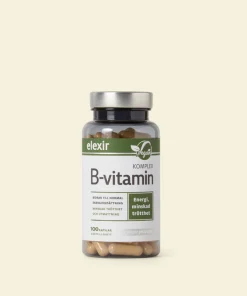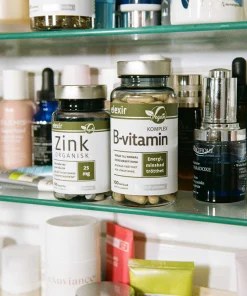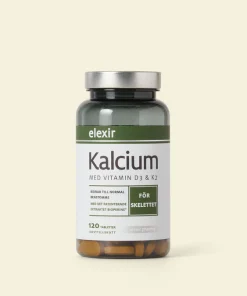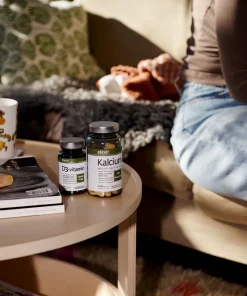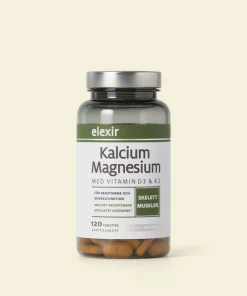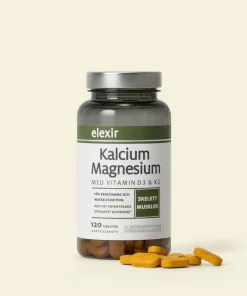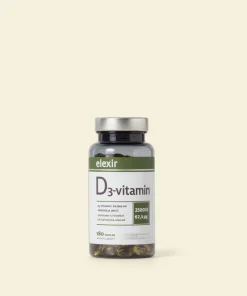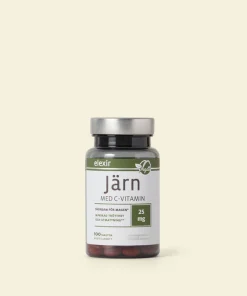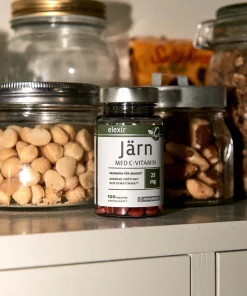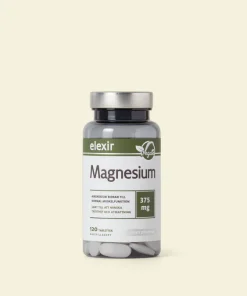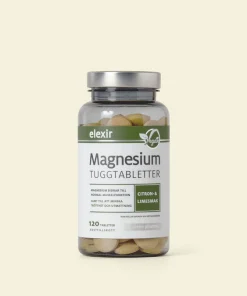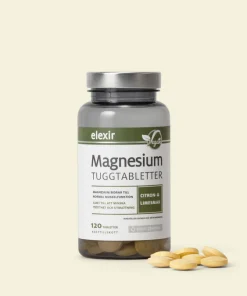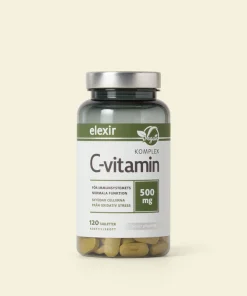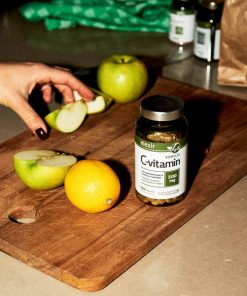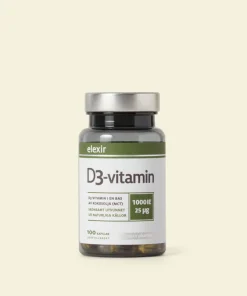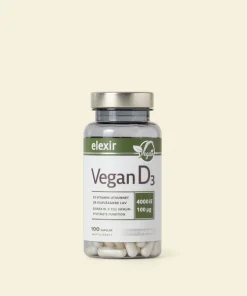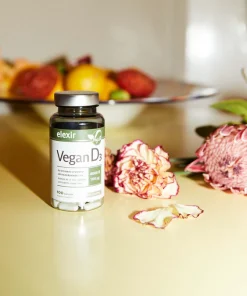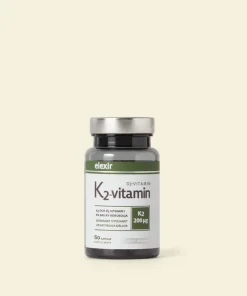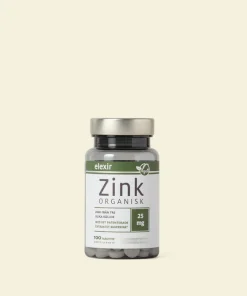There is a large amount of research worldwide which suggests that some of the human health problems and ailments can be derived from vitamin and mineral deficiencies. Regardless of what the research says, we can in any case agree that vitamins and minerals are important components for our health !
Top 5 vitamins
B-vitamin
As many as 8 different water-soluble vitamins belong to the group of B vitamins, all with different properties.
Thiamin (B1) contributes, among other things, to a normal energy metabolism, cardiac and psychological function.
Riboflavin (B2) contributes to maintaining, for example, normal skin and eyesight.
Niacin (B3) contributes to a normal energy metabolism, to maintaining normal mucous membranes and to reducing fatigue and exhaustion.
Pantothenic acid, pyridoxine and cobalamin (B5, B6 and B12) all contribute to, among other things, a normal energy metabolism and to a normal psychological function.
Biotin (B7) contributes to maintaining normal skin and normal hair.
Folic acid (B9) contributes to tissue growth in pregnant women and also plays an important role in the cell division process, which means that a folic acid supplement is often recommended for pregnant women.
On your plate: Meat, offal, fish and grits.
Dietary supplement: B-Complex
C-vitamin
Vitamin C acts as an antioxidant and thus contributes to protecting the body’s cells against oxidative stress. It also contributes to the normal function of the immune system and to normal collagen formation, which is of great importance for the body’s various tissues.
On your plate: Bell peppers, rose hips, papaya, nettles, horseradish, chili peppers
Dietary supplements: vitamin C
D-vitamin
Vitamin D plays an important role for the skeleton, as it contributes to maintaining normal bone structure, muscle function, teeth and also contributes to normal calcium levels in the blood. In addition, vitamin D contributes to the normal functioning of the immune system.
You mainly get vitamin D by staying in the sun, so during the darker months of the year it is recommended that you take a food supplement so that the body can achieve sufficient levels of vitamin D.
On your plate: Fish, eggs and a few fortified dairy products.
Dietary supplements: vitamin D
Vitamin E
Vitamin E acts as an antioxidant which, among other things, protects our tissues by preventing the polyunsaturated fatty acids that build up the membranes from breaking down. Vitamin E also contributes to protecting the body against oxidative stress.
On your plate: Seeds and vegetable oils, margarine, wheat germ, green leafy vegetables, avocados, whole grains, eggs and milk.
Food supplements: Vitamin E
K-vitamin
The interesting thing about vitamin K is that the substance contributes to normal blood coagulation and to maintaining normal bone structure. Vitamin K2 activates a protein, osteocalcin, which is produced by the bone cells and which binds the calcium ions to the bone’s mineral matrix. In this process the skeleton is strengthened.
On your plate: Green leafy vegetables and cabbage (K1) and meat, dairy products and egg yolk (K2).
Dietary supplements: Vitamin K
Top 5 minerals
Iron
Iron is needed to transport oxygen in the body and contributes to the normal formation of red blood cells and hemoglobin. Without enough iron in the body, you can feel tired and listless, have difficulty concentrating, a weakened immune system and in some cases dizziness and/or headaches.
On your plate: Oysters, beef, chicken and nutritious grains.
Dietary supplements: Iron
For increased iron absorption: vitamin C
Potassium
Potassium helps regulate blood pressure while contributing to the normal functioning of the nervous system. It is also needed for regulating the acid-base balance in the body. Potassium is mainly found in fruits and vegetables.
On your plate: Bananas, avocado, baked potato, raisins, tomatoes and artichokes.
Dietary supplements: Potassium
For increased potassium absorption: Magnesium
Calcium
Calcium plays an important role in our health as it is needed, among other things, to maintain normal teeth as well as normal bone structure and muscle function. For children and young people who are growing, it is especially important that they get enough calcium because during this time they store a lot of calcium in their bones. Adequate calcium can also help prevent PMS in women.
On your plate: Dairy products, spinach, kale, broccoli and beans.
Dietary supplements: Calcium
For increased calcium absorption: Magnesium, vitamin D and vitamin C.
Magnesium
Magnesium is involved in over 300 chemical reactions in the body. It affects the energy level in the body and therefore contributes to reducing fatigue and exhaustion. Magnesium also helps to maintain a normal bone structure and normal muscle function and contributes to the electrolyte balance.
On your plate: Spinach, Brussels sprouts, beans, wheat bran, brown rice, fish and meat.
Dietary supplements: Magnesium
For increased magnesium absorption: B vitamin
Zink
Zinc is one of the minerals that has the most beneficial effects in the body. It contributes, among other things, to a normal metabolism of macronutrients, to a normal acid-base balance and to normal fertility and reproduction. Zinc also plays an important role in maintaining a strong immune system. Zinc occurs naturally in, among other things, meat, nuts, seeds, beans, cereals and in milk products. Vegetarians and people who train hard can be at risk of zinc deficiency and can therefore benefit from supplementing their diet with a zinc supplement.
On your plate: Oysters, crab, wheat germ, beans, lentils and chia seeds.
Dietary supplements: Zinc
For increased zinc absorption: Protei
Muscles, Joints & Bones
Elexir Calcium + vitamin D3 & K2 120 Tablets – Made in Sweden
Muscles, Joints & Bones
Immune System
Muscles, Joints & Bones

